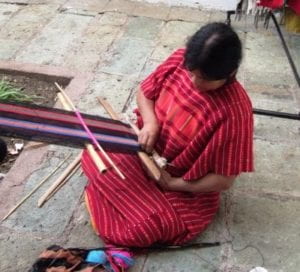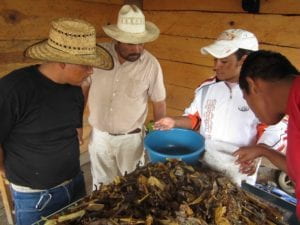Ameneé Siahpush
Oaxaca, Mexico
Global Workers Justice Alliance (GWJA)
I arrived at the office today to find twelve women, ranging from 16 to 70 years old, huddled together around a computer politely debating the color of their future logo, as my coworker, Ignacio, scribbled notes about their requests. They were dressed in traditional, long red dresses—perfectly matching except a slight variation of ribbon that ran vertically down the beautiful cloth. Ignacio clicked through the various designs and color combinations and the women eventually settled on what would soon become the logo found on Triqui handicrafts. A bright yellow line cutting through the middle of red letters. You looked at it and instantly thought of a woven basket. Or of the woven dresses that filled the room.
My research and work as a Gallatin fellow, while in constant evolution, is largely defined by the impact of migration on local indigenous communities and on the state as a whole. I am living in Santiago Juxtlahuaca, a rural town of thirty thousand residents, nestled in the mountains of eastern Oaxaca, Mexico. Oaxaca is one of the most ethnically diverse regions in Mexico, with more than seventy-five percent of the population belonging to an indigenous community. It is also situated as Mexico’s second most impoverished state, where rural infrastructures, basic services, and access to health care and education are described as marginal at best. This prevailing poverty, in large part, has solidified migration as one very commonly accepted path toward economic well-being.
However, many are working hard to change this reality.
El Derecho a No Migrar (The Right to Stay Home/Not Migrate) is a one of the principal projects led by my host organization, Frente Indígena de Organizaciones Binacionales (Indigenous Front of Binational Organizations; FIOB). At its foundation, the project aims to empower indigenous migrant communities to create economic opportunities that stand as sustainable alternatives to migration. El Derecho a No Migrar is divided into two parts. With food production and income generation in mind, the first part is focused on agricultural activities and the second is centered around micro-enterprises such as textile and palm weaving cooperatives. (This is where the beautiful Triqui women and their future logo came into the picture.)
So far, my involvement in this project has fallen on the side of pure observation, rather than an ability to offer more active support. While at times frustrating, as I’m often left wishing I could contribute more, I am slowly finding ways to fit myself into the project. Below is a photo of community visit where I was able to assist a FIOB project leader as she taught a Mixteca family how to grow mushrooms that will later be sold in local open-air markets.
In addition to my work with FIOB, I am also completing a research project for the Brooklyn-based, nonprofit organization Global Workers Justice Alliance. Global Workers was created to combat worker exploitation by promoting portable justice for transnational migrants through a cross-border network of worker advocates and resources. (FIOB is one of the most active members of their Defender Network.) The focus of my research is the current migratory flow of Mexicans to the United States, including information on the highest migrant sending and receiving states, top employment industries, and documentation used to migrate. As a Master of Public Administration student at Wagner, I am particularly interested in how my findings can be used to inform and strengthen Global Workers’ program design and defender expansion, as well as their educational interventions and advocacy efforts.
My position between the two organizations—each with distinct, yet complimentary approaches to migration—provides an invaluable perspective on the realities of this phenomenon and the effect it has on Oaxacan communities on both sides of the border. I look forward to diving deeper into my fellowship work over the next few months, with the hope of gaining the ability to tease apart these human rights issues in a more informed and productive way. Please reach out if you have any advice, thoughts or suggestions: amenee.siahpush@nyu.edu. And best of luck to my fellow NYU adventurers!

